Mazaeus
Mazaeus, Mazday or Mazaios (Aramaic: 𐡌𐡆𐡃𐡉 MZDY, Greek:Μαζαῖος)[1] (died 328 BC) was a Persian noble and satrap of Cilicia and later satrap of Babylon for the Achaemenid Empire, a satrapy which he retained under Alexander the Great.[2]
Mazaeus | |
|---|---|
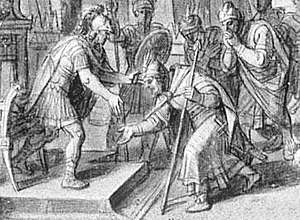 Mazaeus submits Babylon to Alexander the Great. François Verdier (detail). | |
| Native name | Mazaios |
| Allegiance | Achaemenid Empire, Macedonian Empire |
| Rank | Satrap of Cilicia (under the Achaemenids) Satrap of Babylon (under Alexander the Great) |
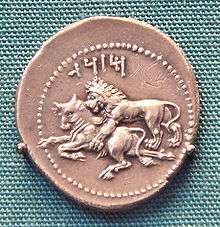
Achaemenid Satrap of Cilicia
Mazaeus was the second last Persian satrap (governor) of Cilicia. His successor in Cilicia was Arsames, who was ultimately expelled by Alexander the Great.
At the Battle of Gaugamela, Mazaeus commanded the right flank with the Syrian, Median, Mesopotamian, Parthian, Sacian, Tapurian, Hyrcanian, Sacesinian, Cappadocian, and Armenian cavalry.
Hellenistic Satrap of Babylon
As a reward for his recognition of Alexander as the legitimate successor of Darius, Mazaeus was rewarded by being able to retain the satrapy of Babylon, as a Hellenistic satrap.[2] Alexander left a Macedonian, Apollodorus of Amphipolis, as the military commander of the garrison of Babylon, and another as tax-collector.[2] Mazaeus continued minting coins under his name, and later without his name.
Personal life
The daughter of the Persian king Darius III, Stateira II, was originally betrothed to him, but he died before they could be married. She was eventually married to Alexander.
It is thought that the Alexander Sarcophagus was actually dedicated to him.[3]
Mazaeus was replaced as satrap of Babylon by Stamenes.[4]
Coinage
Mazaeus has an abundant coinage, which he minted in Tarsos, Sidon and Babylon.
Coinage as Satrap of Cilicia
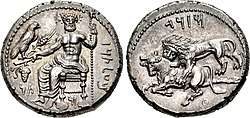
._Circa_353-333_BC.jpg) Mazday (Mazaios) as ruler of Sidon. Circa 353-333 BC.
Mazday (Mazaios) as ruler of Sidon. Circa 353-333 BC.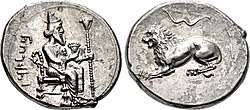
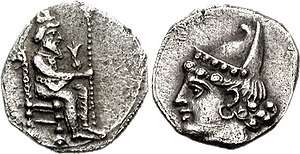
Coinage as Satrap of Babylon
 Coinage of Mazaios as Hellenistic Satrap of Babylon, circa 331-328 BC.
Coinage of Mazaios as Hellenistic Satrap of Babylon, circa 331-328 BC.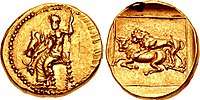 Late coinage of Mazaeus as satrap of Babylon.
Late coinage of Mazaeus as satrap of Babylon.
References
- Metcalf, William (2012). The Oxford Handbook of Greek and Roman Coinage. Oxford University Press USA. ISBN 978-0-19-530574-6.
- O'Brien, J. M. (2003). Alexander the Great: The Invisible Enemy: A Biography. Routledge. p. 94. ISBN 9781134845019.
- Heckel, Waldemar (2006). "Mazaeus, Callisthenes and the Alexander Sarcophagus". Historia. 55 (4): 385–396.
- Roisman, Joseph (2002). Brill's Companion to Alexander the Great. BRILL. p. 189. ISBN 9789004217553.
| Wikimedia Commons has media related to Mazaeus. |